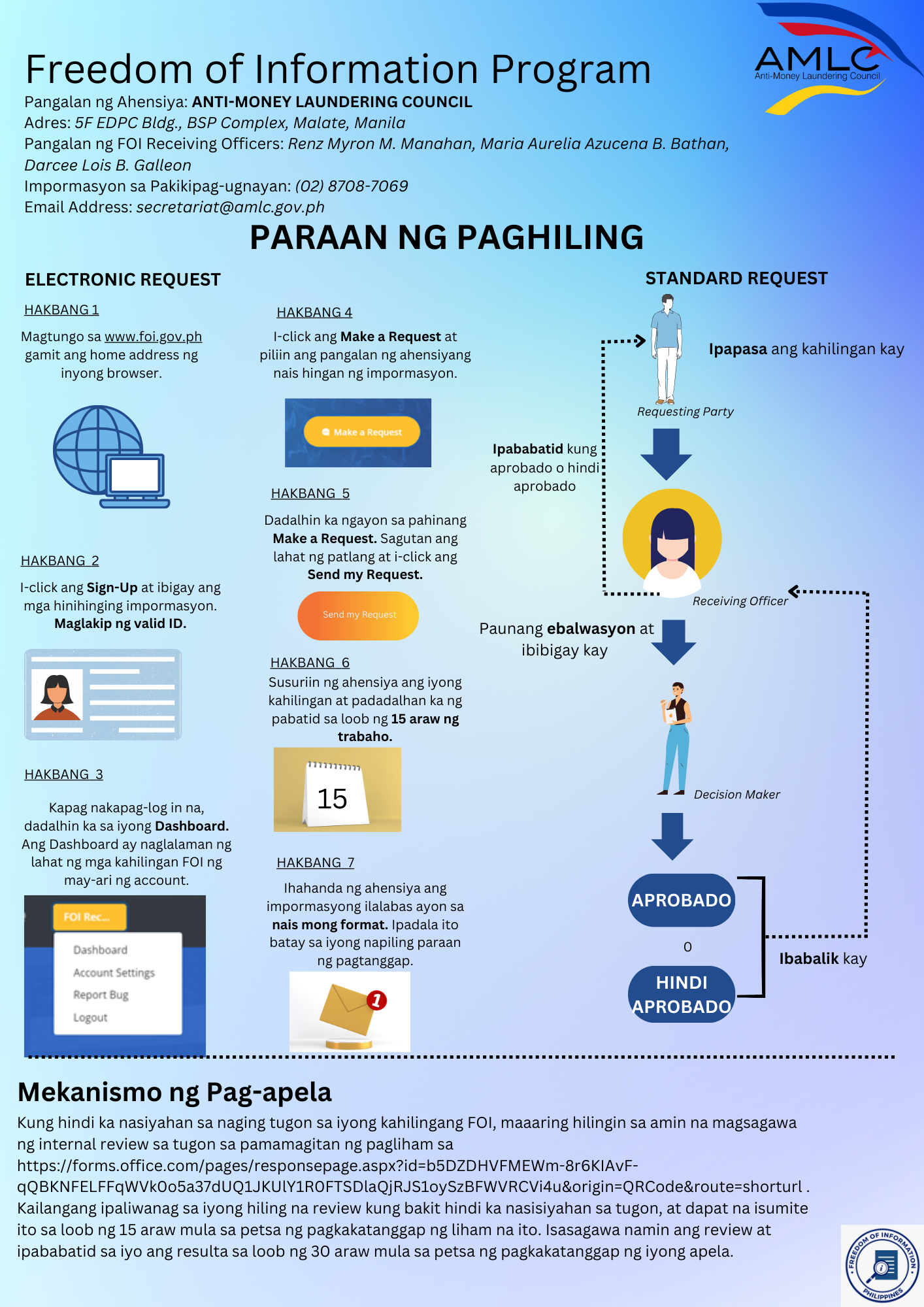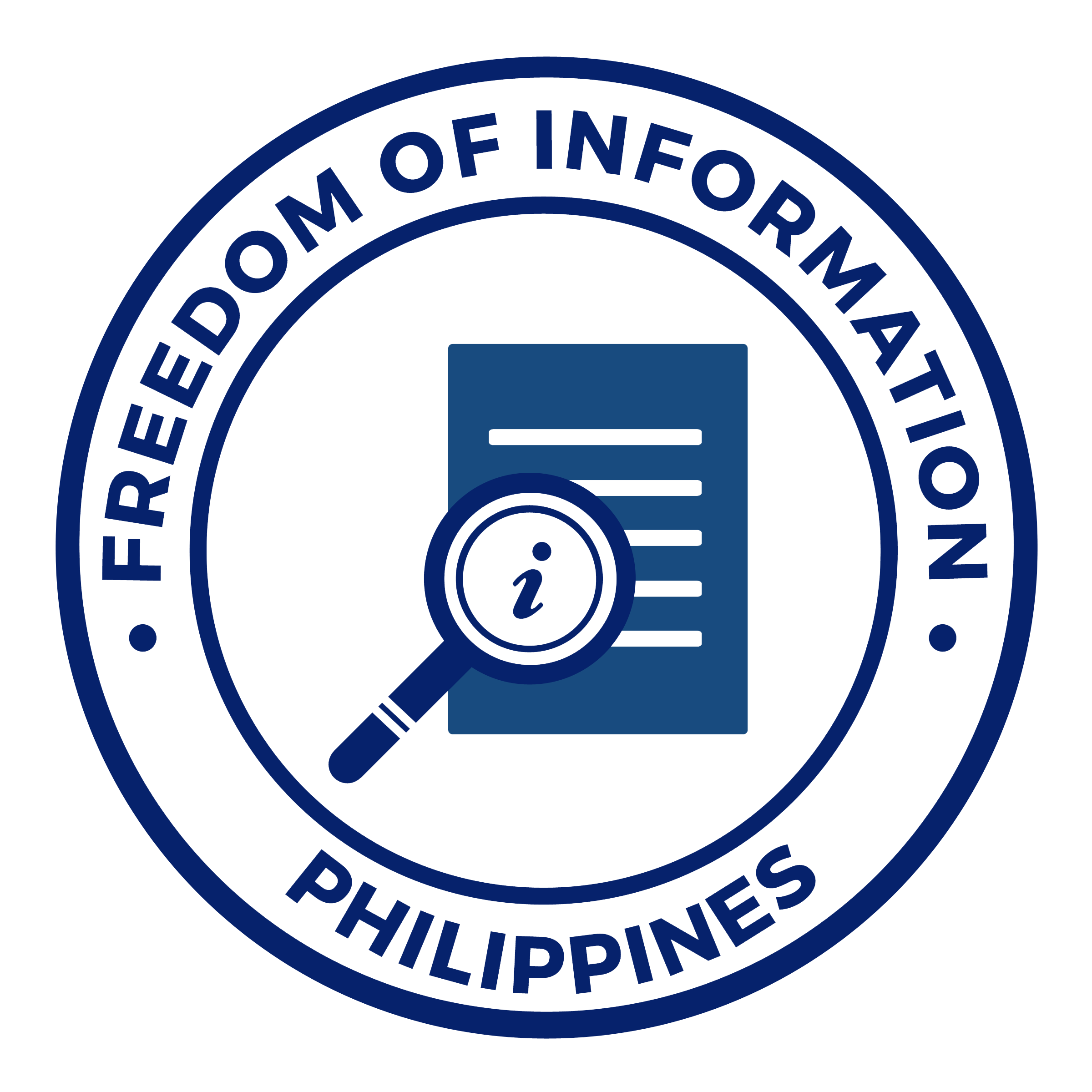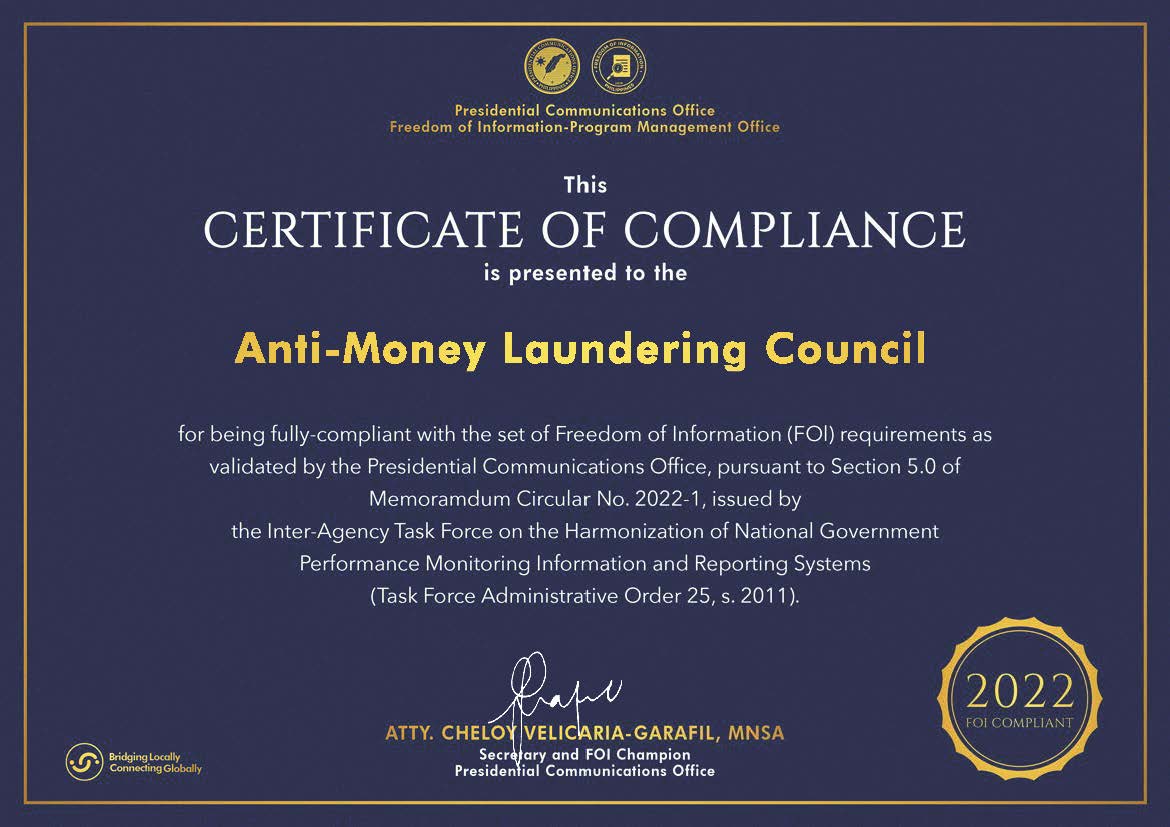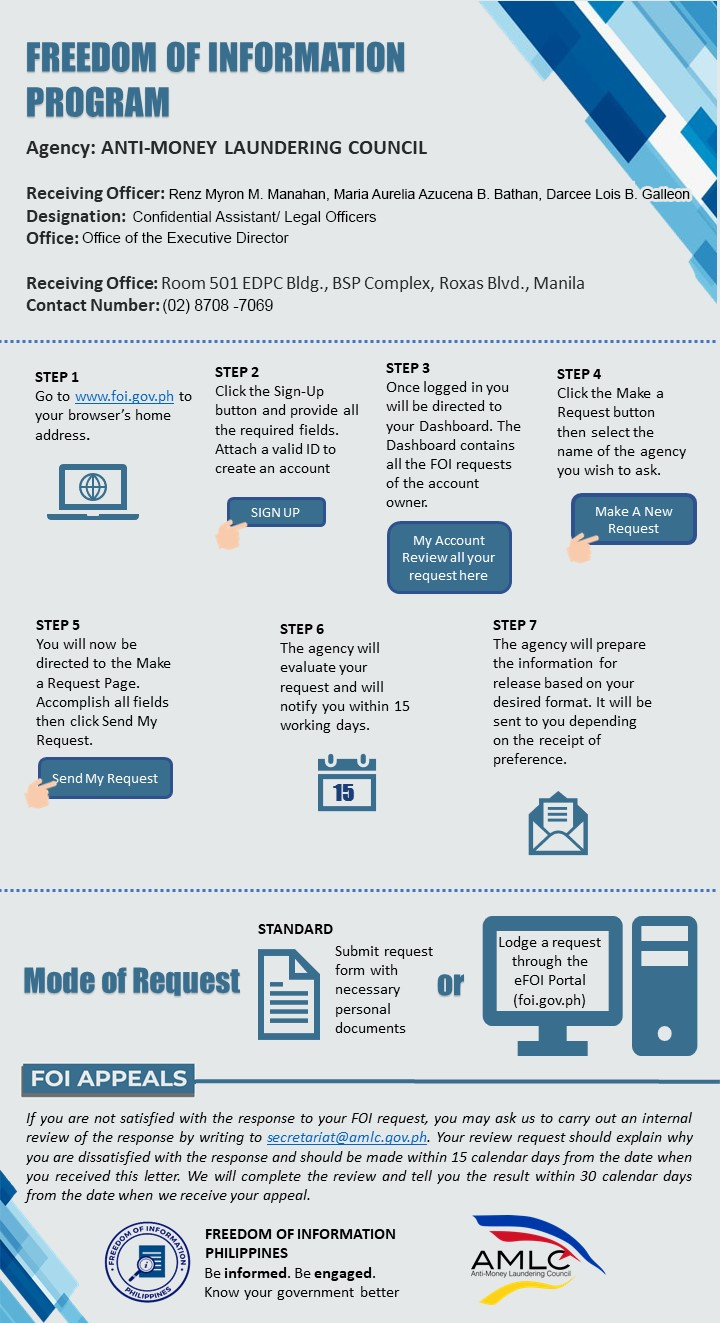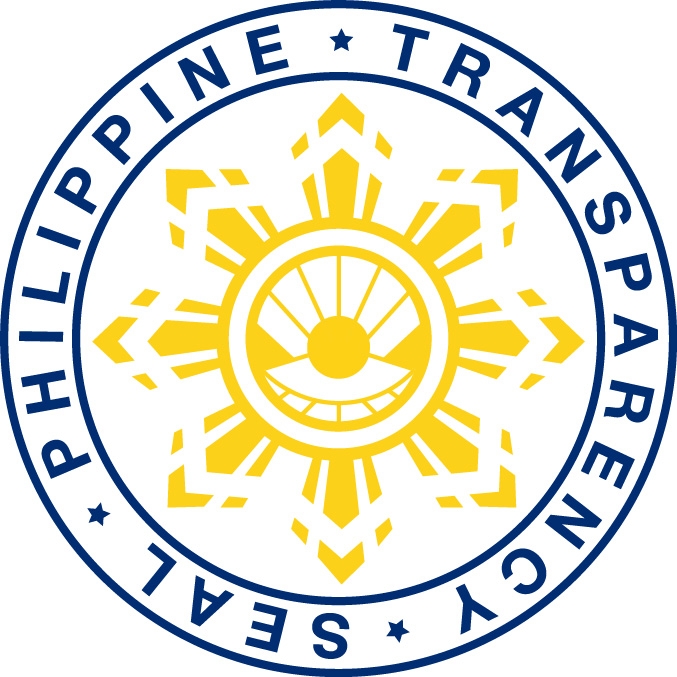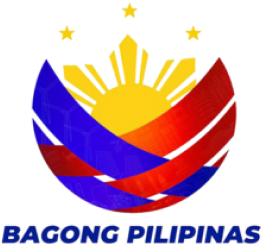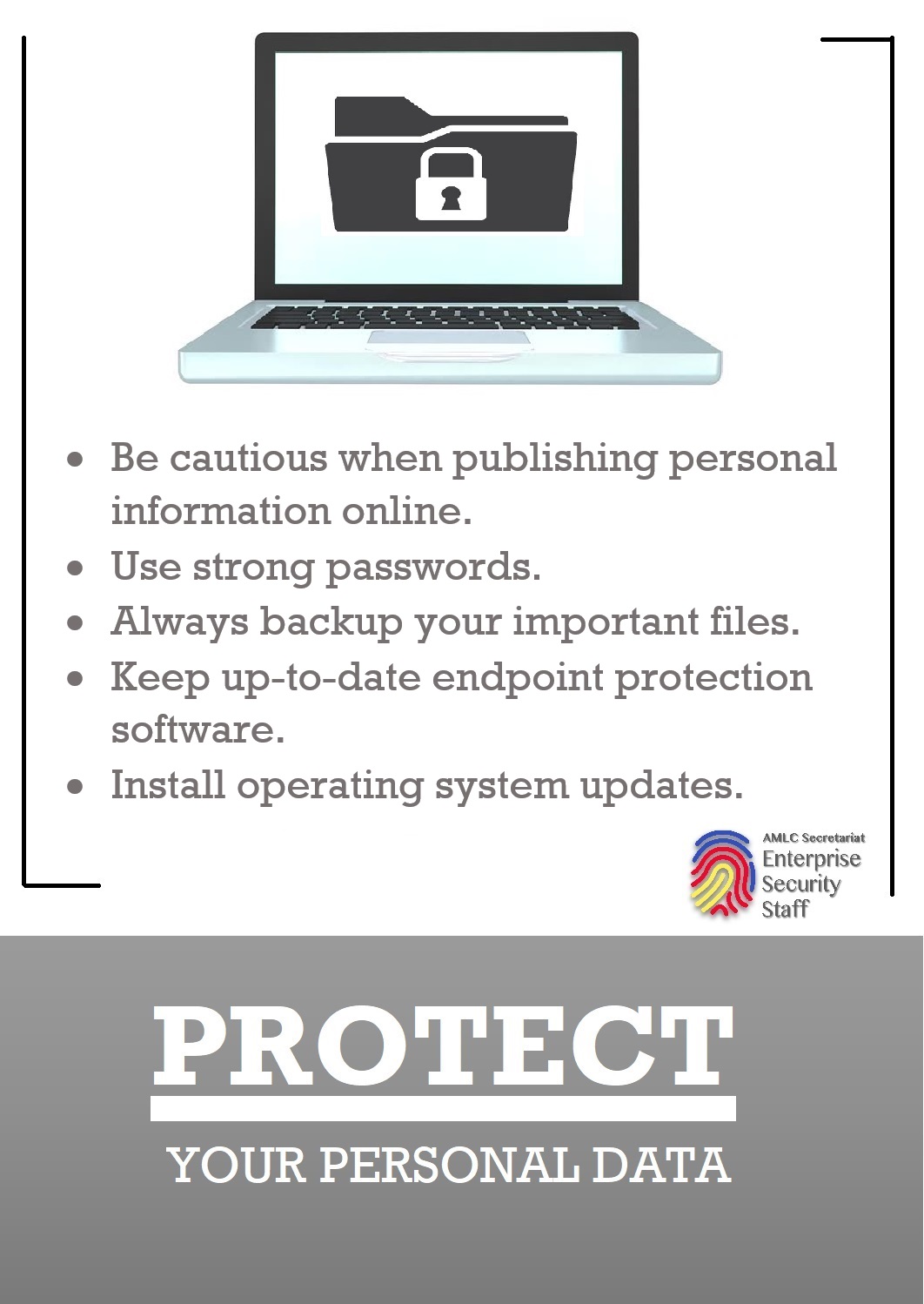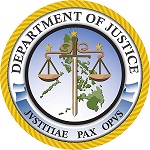Republic of the Philippines
Congress of the Philippines
Metro Manila
Twelfth Congress
First Regular Session
Begun and held in Metro Manila, on Monday, the twenty third day of July, two thousand one.
[REPUBLIC ACT NO. 9160]
AN ACT DEFINING THE CRIME OF MONEY LAUNDERING, PROVIDING PENALTIES THEREFOR AND FOR OTHER PURPOSES
Be it enacted by the Senate and the House of Representatives of the Philippines in Congress assembled.
SECTION 1. Short Title. — This Act shall be known as the “Anti-Money Laundering Act of 2001.”
SEC. 2. Declaration of Policy. — It is hereby declared the policy of the State to protect and preserve the integrity and confidentiality of bank accounts and to ensure that the Philippines shall not be used as a money laundering site for the proceeds of any unlawful activity. Consistent with its foreign policy, the State shall extend cooperation in transnational investigations and prosecutions of persons involved in money laundering activities wherever committed.
SEC. 3. Definitions. — For purposes of this Act, the following terms are hereby defined as follows:
(a) “Covered institution” refers to:
(1) banks, non-banks, quasi-banks, trust entities, and all other institutions and their subsidiaries and affiliates supervised or regulated by the Bangko Sentral ng Pilipinas (BSP);
(2) insurance companies and all other institutions supervised or regulated by the Insurance Commission; and
(3) (i) securities dealers, brokers, salesmen, investment houses and other similar entities managing securities or rendering services as investment agent, advisor, or consultant, (ii) mutual funds, closed-end investment companies, common trust funds, pre-need companies and other similar entities, (iii) foreign exchange corporations, money changers, money payment, remittance, and transfer companies and other similar entities, and (iv) other entities administering or otherwise dealing in currency, commodities or financial derivatives based thereon, valuable objects, cash substitutes and other similar monetary instruments or property supervised or regulated by Securities and Exchange Commission.
(b) “Covered transaction” is a single, series, or combination of transactions involving a total amount in excess of Four million Philippine pesos (Php4,000,000.00) or an equivalent amount in foreign currency based on the prevailing exchange rate within five (5) consecutive banking days except those between a covered institution and a person who, at the time of the transaction was a properly identified client and the amount is commensurate with the business or financial capacity of the client; or those with an underlying legal or trade obligation, purpose, origin or economic justification.
It likewise refers to a single, series or combination or pattern of unusually large and complex transactions in excess of Four million Philippine pesos (Php4,000,000.00) especially cash deposits and investments having no credible purpose or origin, underlying trade obligation or contract.
(c) “Monetary instrument” refers to:
(1) coins or currency of legal tender of the Philippines, or of any other country;
(2) drafts, checks and notes;
(3) securities or negotiable instruments, bonds, commercial papers, deposit certificates, trust certificates, custodial receipts or deposit substitute instruments, trading orders, transaction tickets and confirmations of sale or investments and money market instruments; and
(4) other similar instruments where title thereto passes to another by endorsement, assignment or delivery.
(d) “Offender” refers to any person who commits a money laundering offense.
(e) “Person” refers to any natural or juridical person.
(f) “Proceeds” refers to an amount derived or realized from an unlawful activity.
(g) “Supervising Authority” refers to the appropriate supervisory or regulatory agency, department or office supervising or regulating the covered institutions enumerated in Section 3(a).
(h) “Transaction” refers to any act establishing any right or obligation or giving rise to any contractual or legal relationship between the parties thereto. It also includes any movement of funds by any means with a covered institution.
(i) “Unlawful activity” refers to any act or omission or series or combination thereof involving or having relation to the following:
(1) Kidnapping for ransom under Article 267 of Act No. 3815, otherwise known as the Revised Penal Code, as amended;
(2) Sections 3, 4, 5, 7, 8 and 9 of Article Two of Republic Act No. 6425, as amended, otherwise known as the Dangerous Drugs Act of 1972;
(3) Section 3 paragraphs B, C, E, G, H and I of Republic Act No. 3019, as amended; otherwise known as the Anti-Graft and Corrupt Practices Act;
(4) Plunder under Republic Act No. 7080, as amended;
(5) Robbery and extortion under Articles 294, 295, 296, 299, 300, 301 and 302 of the Revised Penal Code, as amended;
(6) Jueteng and Masiao punished as illegal gambling under Presidential Decree No. 1602;
(7) Piracy on the high seas under the Revised Penal Code, as amended and Presidential Decree No. 532;
(8) Qualified theft under Article 310 of the Revised Penal Code, as amended;
(9) Swindling under Article 315 of the Revised Penal Code, as amended;
(10) Smuggling under Republic Act Nos. 455 and 1937;
(11) Violations under Republic Act No. 8792, otherwise known as the Electronic Commerce Act of 2000;
(12) Hijacking and other violations under Republic Act No. 6235; destructive arson and murder, as defined under the Revised Penal Code, as amended, including those perpetrated by terrorists against non-combatant persons and similar targets;
(13) Fraudulent practices and other violations under Republic Act No. 8799, otherwise known as the Securities Regulation Code of 2000;
(14) Felonies or offenses of a similar nature that are punishable under the penal laws of other countries.
SEC. 4. Money Laundering Offense. — Money laundering is a crime whereby the proceeds of an unlawful activity are transacted, thereby making them appear to have originated from legitimate sources. It is committed by the following:
(a) Any person knowing that any monetary instrument or property represents, involves, or relates to, the proceeds of any unlawful activity, transacts or attempts to transact said monetary instrument or property.
(b) Any person knowing that any monetary instrument or property involves the proceeds of any unlawful activity, performs or fails to perform any act as a result of which he facilitates the offense of money laundering referred to in paragraph (a) above.
(c) Any person knowing that any monetary instrument or property is required under this Act to be disclosed and filed with the Anti-Money Laundering Council (AMLC), fails to do so.
SEC. 5. Jurisdiction of Money Laundering Cases. — The regional trial courts shall have jurisdiction to try all cases on money laundering. Those committed by public officers and private persons who are in conspiracy with such public officers shall be under the jurisdiction of the Sandiganbayan.
SEC. 6. Prosecution of Money Laundering.
(a) Any person may be charged with and convicted of both the offense of money laundering and the unlawful activity as herein defined.
(b) Any proceeding relating to the unlawful activity shall be given precedence over the prosecution of any offense or violation under this Act without prejudice to the freezing and other remedies provided.
SEC. 7. Creation of Anti-Money Laundering Council (AMLC). — The Anti-Money Laundering Council is hereby created and shall be composed of the Governor of the Bangko Sentral ng Pilipinas as chairman, the Commissioner of the Insurance Commission and the Chairman of the Securities and Exchange Commission as members. The AMLC shall act unanimously in the discharge of its functions as defined hereunder:
(1) to require and receive covered transaction reports from covered institutions;
(2) to issue orders addressed to the appropriate Supervising Authority or the covered institution to determine the true identity of the owner of any monetary instrument or property subject of a covered transaction report or request for assistance from a foreign State, or believed by the Council, on the basis of substantial evidence, to be, in whole or in part, wherever located, representing, involving, or related to, directly or indirectly, in any manner or by any means, the proceeds of an unlawful activity;
(3) to institute civil forfeiture proceedings and all other remedial proceedings through the Office of the Solicitor General;
(4) to cause the filing of complaints with the Department of Justice or the Ombudsman for the prosecution of money laundering offenses;
(5) to initiate investigations of covered transactions, money laundering activities and other violations of this Act;
(6) to freeze any monetary instrument or property alleged to be proceeds of any unlawful activity;
(7) to implement such measures as may be necessary and justified under this Act to counteract money laundering;
(8) to receive and take action in respect of, any request from foreign states for assistance in their own anti-money laundering operations provided in this Act;
(9) to develop educational programs on the pernicious effects of money laundering, the methods and techniques used in money laundering, the viable means of preventing money laundering and the effective ways of prosecuting and punishing offenders; and
(10) to enlist the assistance of any branch, department, bureau, office, agency or instrumentality of the government, including government-owned and -controlled corporations, in undertaking any and all anti-money laundering operations, which may include the use of its personnel, facilities and resources for the more resolute prevention, detection and investigation of money laundering offenses and prosecution of offenders.
SEC. 8. Creation of a Secretariat. — The AMLC is hereby authorized to establish a secretariat to be headed by an Executive Director who shall be appointed by the Council for a term of five (5) years. He must be a member of the Philippine Bar, at least thirty-five (35) years of age and of good moral character, unquestionable integrity and known probity. All members of the Secretariat must have served for at least five (5) years either in the Insurance Commission, the Securities and Exchange Commission or the Bangko Sentral ng Pilipinas (BSP) and shall hold full-time permanent positions within the BSP.
SEC. 9. Prevention of Money Laundering; Customer Identification Requirements and Record Keeping. — (a) Customer Identification. — Covered institutions shall establish and record the true identity of its clients based on official documents. They shall maintain a system of verifying the true identity of their clients and, in case of corporate clients, require a system of verifying their legal existence and organizational structure, as well as the authority and identification of all persons purporting to act on their behalf.
The provisions of existing laws to the contrary notwithstanding, anonymous accounts, accounts under fictitious names, and all other similar accounts shall be absolutely prohibited. Peso and foreign currency non-checking numbered accounts shall be allowed. The BSP may conduct annual testing solely limited to the determination of the existence and true identity of the owners of such accounts.
(b) Record Keeping. — All records of all transactions of covered institutions shall be maintained and safely stored for five (5) years from the dates of transactions. With respect to closed accounts, the records on customer identification, account files and business correspondence, shall be preserved and safely stored for at least five (5) years from the dates when they were closed.
(c) Reporting of Covered Transactions. — Covered institutions shall report to the AMLC all covered transactions within five (5) working days from occurrence thereof, unless the Supervising Authority concerned prescribes a longer period not exceeding ten (10) working days.
When reporting covered transactions to the AMLC, covered institutions and their officers, employees, representatives, agents, advisors, consultants or associates shall not be deemed to have violated Republic Act No. 1405, as amended; Republic Act No. 6426, as amended; Republic Act No. 8791 and other similar laws, but are prohibited from communicating, directly or indirectly, in any manner or by any means, to any person the fact that a covered transaction report was made, the contents thereof, or any other information in relation thereto. In case of violation thereof, the concerned officer, employee, representative, agent, advisor, consultant or associate of the covered institution, shall be criminally liable. However, no administrative, criminal or civil proceedings, shall lie against any person for having made a covered transaction report in the regular performance of his duties and in good faith, whether or not such reporting results in any criminal prosecution under this Act or any other Philippine law.
When reporting covered transactions to the AMLC, covered institutions and their officers, employees, representatives, agents, advisors, consultants or associates are prohibited from communicating, directly or indirectly, in any manner or by any means, to any person, entity, the media, the fact that a covered transaction report was made, the contents thereof, or any other information in relation thereto. Neither may such reporting be published or aired in any manner or form by the mass media, electronic mail, or other similar devices. In case of violation thereof, the concerned officer, employee, representative, agent, advisor, consultant or associate of the covered institution, or media shall be held criminally liable.
SEC. 10. Authority to Freeze. — Upon determination that probable cause exists that any deposit or similar account is in any way related to an unlawful activity, the AMLC may issue a freeze order, which shall be effective immediately, on the account for a period not exceeding fifteen (15) days. Notice to the depositor that his account has been frozen shall be issued simultaneously with the issuance of the freeze order. The depositor shall have seventy-two (72) hours upon receipt of the notice to explain why the freeze order should be lifted. The AMLC has seventy-two (72) hours to dispose of the depositor’s explanation. If it fails to act within seventy-two (72) hours from receipt of the depositor’s explanation, the freeze order shall automatically be dissolved. The fifteen (15)-day freeze order of the AMLC may be extended upon order of the court, provided that the fifteen (15)-day period shall be tolled pending the court’s decision to extend the period.
No court shall issue a temporary restraining order or writ of injunction against any freeze order issued by the AMLC except the Court of Appeals or the Supreme Court.
SEC. 11. Authority to Inquire into Bank Deposits. — Notwithstanding the provisions of Republic Act No. 1405, as amended; Republic Act No. 6426, as amended; Republic Act No. 8791, and other laws, the AMLC may inquire into or examine any particular deposit or investment with any banking institution or non-bank financial institution upon order of any competent court in cases of violation of this Act when it has been established that there is probable cause that the deposits or investments involved are in any way related to a money laundering offense: Provided, That this provision shall not apply to deposits and investments made prior to the effectivity of this Act.
SEC. 12. Forfeiture Provisions.
(a) Civil Forfeiture. — When there is a covered transaction report made, and the court has, in a petition filed for the purpose ordered seizure of any monetary instrument or property, in whole or in part, directly or indirectly, related to said report, the Revised Rules of Court on civil forfeiture shall apply.
(b) Claim on Forfeiture Assets. — Where the court has issued an order of forfeiture of the monetary instrument or property in a criminal prosecution for any money laundering offense defined under Section 4 of this Act, the offender or any other person claiming an interest therein may apply, by verified petition, for a declaration that the same legitimately belongs to him and for segregation or exclusion of the monetary instrument or property corresponding thereto. The verified petition shall be filed with the court which rendered the judgment of conviction and order of forfeiture, within fifteen (15) days from the date of the order of forfeiture, in default of which the said order shall become final and executory. This provision shall apply in both civil and criminal forfeiture.
(c) Payment in Lieu of Forfeiture. — Where the court has issued an order of forfeiture of the monetary instrument or property subject of a money laundering offense defined under Section 4, and said order cannot be enforced because any particular monetary instrument or property cannot, with due diligence, be located, or it has been substantially altered, destroyed, diminished in value or otherwise rendered worthless by any act or omission, directly or indirectly, attributable to the offender, or it has been concealed, removed, converted or otherwise transferred to prevent the same from being found or to avoid forfeiture thereof, or it is located outside the Philippines or has been placed or brought outside the jurisdiction of the court, or it has been commingled with other monetary instruments or property belonging to either the offender himself or a third person or entity, thereby rendering the same difficult to identify or be segregated for purposes of forfeiture, the court may, instead of enforcing the order of forfeiture of the monetary instrument or property or part thereof or interest therein, accordingly order the convicted offender to pay an amount equal to the value of said monetary instrument or property. This provision shall apply in both civil and criminal forfeiture.
SEC. 13. Mutual Assistance among States.
(a) Request for Assistance from a Foreign State. — Where a foreign State makes a request for assistance in the investigation or prosecution of a money laundering offense, the AMLC may execute the request or refuse to execute the same and inform the foreign State of any valid reason for not executing the request or for delaying the execution thereof. The principles of mutuality and reciprocity shall, for this purpose, be at all times recognized.
(b) Powers of the AMLC to Act on a Request for Assistance from a Foreign State. — The AMLC may execute a request for assistance from a foreign State by: (1) tracking down, freezing, restraining and seizing assets alleged to be proceeds of any unlawful activity under the procedures laid down in this Act; (2) giving information needed by the foreign State within the procedures laid down in this Act; and (3) applying for an order of forfeiture of any monetary instrument or property in the court: Provided, That the court shall not issue such an order unless the application is accompanied by an authenticated copy of the order of a court in the requesting State ordering the forfeiture of said monetary instrument or property of a person who has been convicted of a money laundering offense in the requesting State, and a certification or an affidavit of a competent officer of the requesting State stating that the conviction and the order of forfeiture are final and that no further appeal lies in respect of either.
(c) Obtaining Assistance from Foreign States. — The AMLC may make a request to any foreign State for assistance in (1) tracking down, freezing, restraining and seizing assets alleged to be proceeds of any unlawful activity; (2) obtaining information that it needs relating to any covered transaction, money laundering offense or any other matter directly or indirectly related thereto; (3) to the extent allowed by the law of the foreign State, applying with the proper court therein for an order to enter any premises belonging to or in the possession or control of, any or all of the persons named in said request, and/or search any or all such persons named therein and/or remove any document, material or object named in said request: Provided, That the documents accompanying the request in support of the application have been duly authenticated in accordance with the applicable law or regulation of the foreign State; and (4) applying for an order of forfeiture of any monetary instrument or property in the proper court in the foreign State: Provided, That the request is accompanied by an authenticated copy of the order of the regional trial court ordering the forfeiture of said monetary instrument or property of a convicted offender and an affidavit of the clerk of court stating that the conviction and the order of forfeiture are final and that no further appeal lies in respect of either.
(d) Limitations on Request for Mutual Assistance. — The AMLC may refuse to comply with any request for assistance where the action sought by the request contravenes any provision of the Constitution or the execution of a request is likely to prejudice the national interest of the Philippines unless there is a treaty between the Philippines and the requesting State relating to the provision of assistance in relation to money laundering offenses.
(e) Requirements for Requests for Mutual Assistance from Foreign States. — A request for mutual assistance from a foreign State must (1) confirm that an investigation or prosecution is being conducted in respect of a money launderer named therein or that he has been convicted of any money laundering offense; (2) state the grounds on which any person is being investigated or prosecuted for money laundering or the details of his conviction; (3) give sufficient particulars as to the identity of said person; (4) give particulars sufficient to identify any covered institution believed to have any information, document, material or object which may be of assistance to the investigation or prosecution; (5) ask from the covered institution concerned any information, document, material or object which may be of assistance to the investigation or prosecution; (6) specify the manner in which and to whom said information, document, material or object obtained pursuant to said request, is to be produced; (7) give all the particulars necessary for the issuance by the court in the requested State of the writs, orders or processes needed by the requesting State; and (8) contain such other information as may assist in the execution of the request.
(f) Authentication of Documents. — For purposes of this Section, a document is authenticated if the same is signed or certified by a judge, magistrate or equivalent officer in or of, the requesting State, and authenticated by the oath or affirmation of a witness or sealed with an official or public seal of a minister, secretary of State, or officer in or of, the government of the requesting State, or of the person administering the government or a department of the requesting territory, protectorate or colony. The certificate of authentication may also be made by a secretary of the embassy or legation, consul general, consul, vice consul, consular agent or any officer in the foreign service of the Philippines stationed in the foreign State in which the record is kept, and authenticated by the seal of his office.
(g) Extradition. — The Philippines shall negotiate for the inclusion of money laundering offenses as herein defined among extraditable offenses in all future treaties.
SEC. 14. Penal Provisions. — (a) Penalties for the Crime of Money Laundering. The penalty of imprisonment ranging from seven (7) to fourteen (14) years and a fine of not less than Three million Philippine pesos (Php3,000,000.00) but not more than twice the value of the monetary instrument or property involved in the offense, shall be imposed upon a person convicted under Section 4(a) of this Act.
The penalty of imprisonment from four (4) to seven (7) years and a fine of not less than One million five hundred thousand Philippine pesos (Php1,500,000.00) but not more than Three million Philippine pesos (Php3,000,000.00), shall be imposed upon a person convicted under Section 4(b) of this Act.
The penalty of imprisonment from six (6) months to four (4) years or a fine of not less than One hundred thousand Philippine pesos (Php100,000.00) but not more than Five hundred thousand Philippine pesos (Php500,000.00), or both, shall be imposed on a person convicted under Section 4(c) of this Act.
(b) Penalties for Failure to Keep Records. The penalty of imprisonment from six (6) months to one (1) year or a fine of not less than One hundred thousand Philippine pesos (Php100,000.00) but not more than Five hundred thousand Philippine pesos (Php500,000.00), or both, shall be imposed on a person convicted under Section 9(b) of this Act.
(c) Malicious Reporting. Any person who, with malice, or in bad faith, report or files a completely unwarranted or false information relative to money laundering transaction against any person shall be subject to a penalty of six (6) months to four (4) years imprisonment and a fine of not less than One hundred thousand Philippine pesos (Php100,000.00) but not more than Five hundred thousand Philippine pesos (Php500,000.00), at the discretion of the court: Provided, That the offender is not entitled to avail the benefits of the Probation Law.
If the offender is a corporation, association, partnership or any juridical person, the penalty shall be imposed upon the responsible officers, as the case may be, who participated in the commission of the crime or who shall have knowingly permitted or failed to prevent its commission. If the offender is a juridical person, the court may suspend or revoke its license. If the offender is an alien, he shall, in addition to the penalties herein prescribed, be deported without further proceedings after serving the penalties herein prescribed. If the offender is a public official or employee, he shall, in addition to the penalties prescribed herein, suffer perpetual or temporary absolute disqualification from office, as the case may be.
Any public official or employee who is called upon to testify and refuses to do the same or purposely fails to testify shall suffer the same penalties prescribed herein.
(d) Breach of Confidentiality. The punishment of imprisonment ranging from three (3) to eight (8) years and a fine of not less than Five hundred thousand Philippine pesos (Php500,000.00) but not more than One million Philippine pesos (Php1,000,000.00), shall be imposed on a person convicted for a violation under Section 9(c).
SEC. 15. System of Incentives and Rewards. — A system of special incentives and rewards is hereby established to be given to the appropriate government agency and its personnel that led and initiated an investigation, prosecution and conviction of persons involved in the offense penalized in Section 4 of this Act.
SEC. 16. Prohibitions Against Political Harassment. — This Act shall not be used for political persecution or harassment or as an instrument to hamper competition in trade and commerce.
No case for money laundering may be filed against and no assets shall be frozen, attached or forfeited to the prejudice of a candidate for an electoral office during an election period.
SEC. 17. Restitution. — Restitution for any aggrieved party shall be governed by the provisions of the New Civil Code.
SEC. 18. Implementing Rules and Regulations. — Within thirty (30) days from the effectivity of this Act, the Bangko Sentral ng Pilipinas, the Insurance Commission and the Securities and Exchange Commission shall promulgate the rules and regulations to implement effectively the provisions of this Act. Said rules and regulations shall be submitted to the Congressional Oversight Committee for approval.
Covered institutions shall formulate their respective money laundering prevention programs in accordance with this Act including, but not limited to, information dissemination on money laundering activities and its prevention, detection and reporting, and the training of responsible officers and personnel of covered institutions.
SEC. 19. Congressional Oversight Committee. — There is hereby created a Congressional Oversight Committee composed of seven (7) members from the Senate and seven (7) members from the House of Representatives. The members from the Senate shall be appointed by the Senate President based on the proportional representation of the parties or coalitions therein with at least two (2) Senators representing the minority. The members from the House of Representatives shall be appointed by the Speaker also based on proportional representation of the parties or coalitions therein with at least two (2) members representing the minority.
The Oversight Committee shall have the power to promulgate its own rules, to oversee the implementation of this Act, and to review or revise the implementing rules issued by the Anti-Money Laundering Council within thirty (30) days from the promulgation of the said rules.
SEC. 20. Appropriations Clause. — The AMLC shall be provided with an initial appropriation of Twenty-five million Philippine pesos (Php25,000,000.00) to be drawn from the national government. Appropriations for the succeeding years shall be included in the General Appropriations Act.
SEC. 21. Separability Clause. — If any provision or section of this Act or the application thereof to any person or circumstance is held to be invalid, the other provisions or sections of this Act, and the application of such provision or section to other persons or circumstances, shall not be affected thereby.
SEC. 22. Repealing Clause. — All laws, decrees, executive orders, rules and regulations or parts thereof, including the relevant provisions of Republic Act No. 1405, as amended; Republic Act No. 6426, as amended; Republic Act No. 8791, as amended and other similar laws, as are inconsistent with this Act, are hereby repealed, amended or modified accordingly.
SEC. 23. Effectivity. — This Act shall take effect fifteen (15) days after its complete publication in the Official Gazette or in at least two (2) national newspapers of general circulation.
The provisions of this Act shall not apply to deposits and investments made prior to its effectivity.
Approved,
(Sgd.) FRANKLIN M. DRILON
President of the Senate |
(Sgd.) JOSE DE VENECIA JR.
Speaker of the House
of Representatives |
This Act which is a consolidation of House Bill No. 3083 and Senate Bill No. 1745 was finally passed by the House of Representatives and the Senate on September 29, 2001.
(Sgd.) OSCAR G. YABES
Secretary of the Senate |
(Sgd.) ROBERTO P. NAZARENO
Secretary General
House of Representatives |
Approved: SEP 29 2001
(Sgd.) GLORIA MACAPAGAL-ARROYO
President of the Philippines
Download PDF Version: Republic Act No. 9160


 REVISED 2 3.jpg)

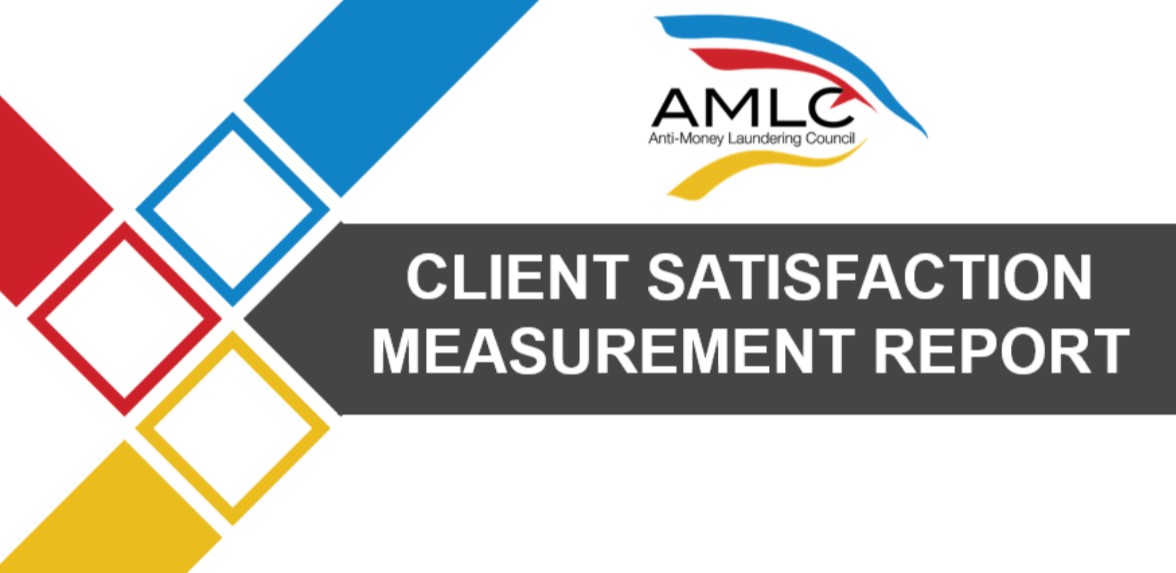 2024 (First Edition)
2024 (First Edition)